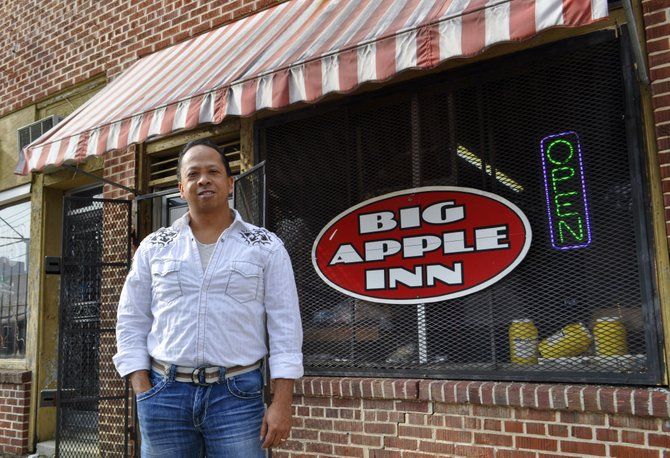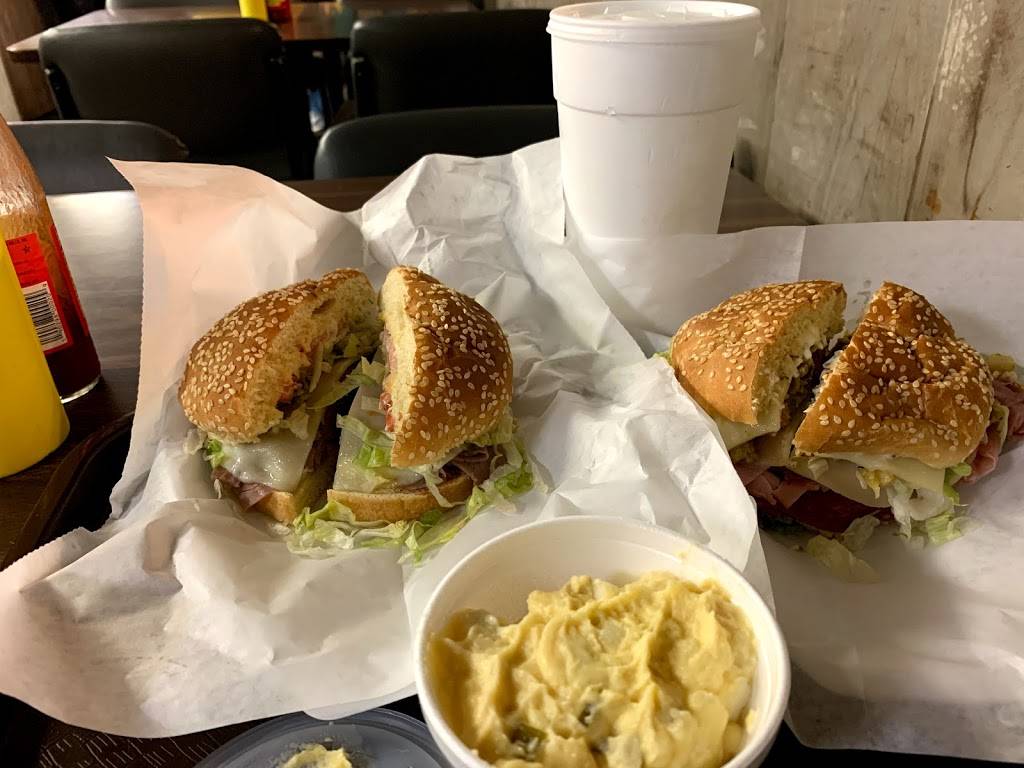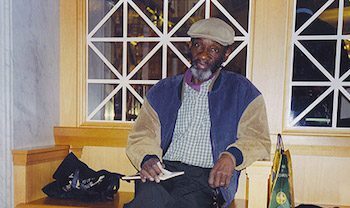
Geno Lee with Big Apple Inn
A legacy of smokes and ears in Jackson. It ain’t pretty – but it’s perfect.
Beyond the towering buildings of downtown Jackson, through the big buildings full of office folks and central air conditioning lies Farish Street. In the post-emancipation days, this was a bustling place of gathering and working for the black community, nestled six blocks away from where white folks were doing their business; back then, six blocks was quite the distance.
Nowadays, turning on to Farrish Street is like looking at a portrait of history. The brick road doesn’t see many cars and the buildings are blighted. The ones that aren’t abandoned are in desperate need of work well beyond the sticker worth of the building, but the lack of attention to the area hasn’t created an urgency to restore them to their former glory – or even tear them down. Other than distant sounds of passing vehicles, and the occasional yelled greeting from one person to another in the distance, Farish Street is as still and quiet as a picture.
But continue to walk down past the historic Alamo Theater, and there’s a flurry of steady activity through an old glass door – the kind that really could be pushed or pulled, since it has aged so – with faded words BIG APPLE INN.
Step into the Big Apple Inn, and instantly you’re greeted by the sizzling smoke of the grill right by the front door. The grill separates you and the cook with a simple counter and plastic guard in between. The spice floating in the air tickles your nose, along with the biting smell of mustard.
You’ve got two iconic sandwiches here: smokes and ears. Smokes are sausage sandwiches, served either spicy, mild, or with no spice. The spicy and the mild varieties come with the in-house made hot sauce that has been a secret recipe and staple for over eight decades. Ears – pig ears, that is – are sliced, boiled down and served with slaw and mustard sauce. Smokes and ears are both served in their greasy, messy, spicy goodness on a slider bun, in a paper bag with plenty of napkins. Want to add a drink? Visit the Coke machine.

The decor is worn at best. Mismatched orange, yellow and red chairs are at old wood-paneled tables. Wood paneling continues up the walls, but not completely to the ceiling – various coverings here are found, not uniform in any way. There’s air conditioning condensation dripping from the vents, fans are blowing, the grill is sizzling, and there’s a man in the back slicing into pig ears, by hand with a large knife, one at the time.
It ain’t pretty – but it’s perfect.
Big Apple History
Big Apple Inn has been the heart and soul of its owner, Geno Lee, since the early 90s. He left his former life as a stockbroker to take over the family business when his uncle, who managed it at the time, got sick.
“I didn’t plan on being in the restaurant business,” said Lee. “I didn’t grow up in Jackson. Before I moved here at 17 years-old, all I knew was that this was a family restaurant, and I came here to get sandwiches. That’s it.”
Geno and his dad left their jobs as stockbroker and a school principal to manage the business, with little-to-no restaurant experience, and a desire to keep the then 50-year-old eatery going.
The recipes that Big Apple Inn are known for started with a modest street vendor who would sell hot tamales outside of the Alamo theater, right down the street from where Big Apple Inn still is today.
“My great-grandfather was the pioneer of bringing pig ear sandwiches into the city,” said Lee.
Eating pig ears dates back to the days of slavery, when the owners would eat the ribs and the pork chops, and give the snouts, feet, and ears to the slaves. Lee said that eating pig ears at the time wasn’t the selling point – it’s the fact that this traditional food among the black population had made its way into the city.
“My great-grandfather, Juan Mora, was just a short, fat Mexican man that came here because he heard there was opportunity,” said Lee.
His great-grandfather knew that with slavery ending, someone had to pick the cotton in the fields—this drew a lot of Mexican migrants to the Magnolia State and across the South.
“But being the short, fat Mexican man that he was, he realized after working in the fields, in that Mississippi heat, that he wasn’t built to pick cotton,” Lee joked. “So, he started selling his mother’s hand-rolled hot tamales over an open grill outside of the Alamo theater before opening Big Apple Inn in 1939.”
Hot tamales are still sold at Big Apple Inn today, using the same recipe. In fact, Big Apple Inn is one of the tamale hotspots on the Mississippi Delta Hot Tamale Trail.
Once Juan, who became known as Big John, opened Big Apple Inn, he started selling his signature hot tamales, as well as the iconic smoked sausage sandwiches that make the establishment’s reputation stand even to this day.
Big John would take the fiery red casing off the Mississippi-made smoked sausage, grind the sausage up, and put it on the slider bun with the mustard sauce, slaw, and homemade hot sauce; all of which are still used today.
The local butcher began giving the pig ears to Big John by the case; until the restaurateur began to make what would be considered a throwaway cut a sensation.
“My great-grandfather learned that if you boiled pig ears for three days, they were edible,” said Lee. “So, he began to slice them, boil them, and put them on a slider bun with mustard sauce, homemade hot sauce and slaw. When he started making money off of them, the butcher started charging him.”
Frozen in time, fighting change
When you walk into the Big Apple Inn today, you’ll see the same exact setup, the same recipes, the same decor. And while modern amenities like refrigeration and delivery have made life a little easier at the Big Apple Inn, there’s not much more change outside of that.
In fact, that’s how folks like it.
“When we took over the restaurant 30 years ago, we closed for a while to remodel,” said Lee. “We brought in new diner seating and tables, stainless steel things… and when we re-opened, business completely plummeted. We weren’t what people knew as the Big Apple Inn.”
Everything that Lee had planned to toss out was still in the back area behind the restaurant. After seeing the reaction from the public, he swapped the new out for the old, and business was booming again.
Big Apple Inn got its start selling the sandwiches for a nickel a piece. Now the sandwiches are a modest $2 each.
“I joke that this is a hood business, so I have to charge hood prices,” said Lee. “And I got complaints over the $2, even with the prices only increasing $1.95 in 80 years. So, we operate at these lower prices to our detriment, but this is a service to the community.”

Lee, who has a heart for service and ministry, said that even with the modest prices, he still manages to take care of his 12 person staff, even if it means taking on side gigs.
“We’re family,” said Lee. “Most of my employees have been here a decade at least, some over 20 years. I’m going to take care of them.”
The preservation of Big Apple Inn has garnered the iconic “smokes and ears” place much deserved international attention. Big Apple Inn has been featured on Food Network, CNN, and ESPN Gameday, plus countless magazine and newspaper publications. The late Anthony Bourdain visited the Big Apple Inn as well, when filming his show, Parts Unknown, calling the pig ear sandwich “everything you love about the pig, fatty yet lean…. Good, and hard to beat.”
To get your hands on smokes, ears, and tamales, visit Big Apple Inn at its historic Farish Street Jackson location, or at its second location at North State Street in Jackson.











